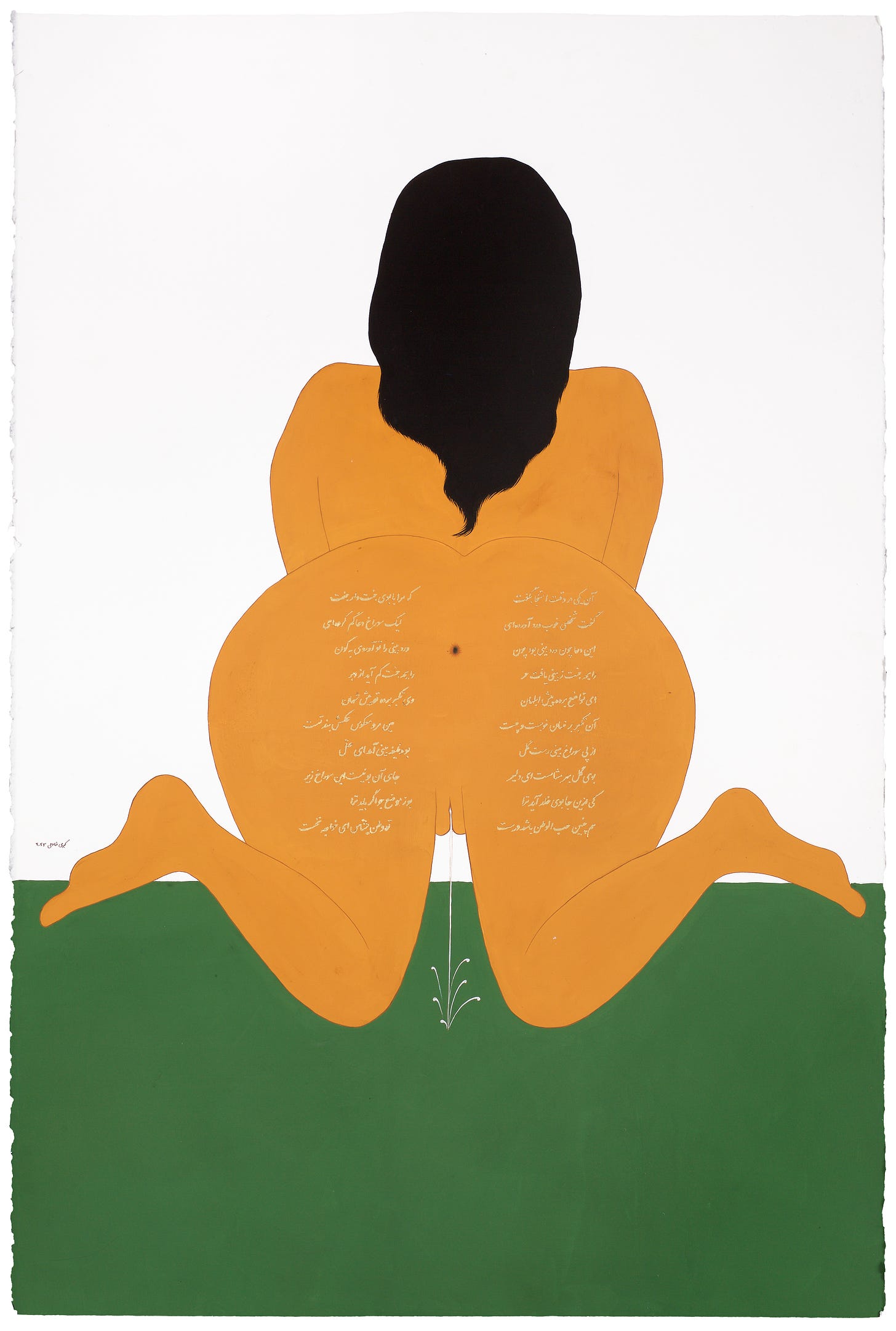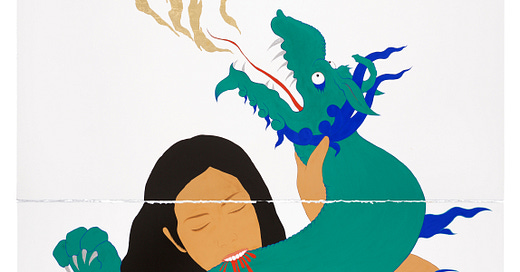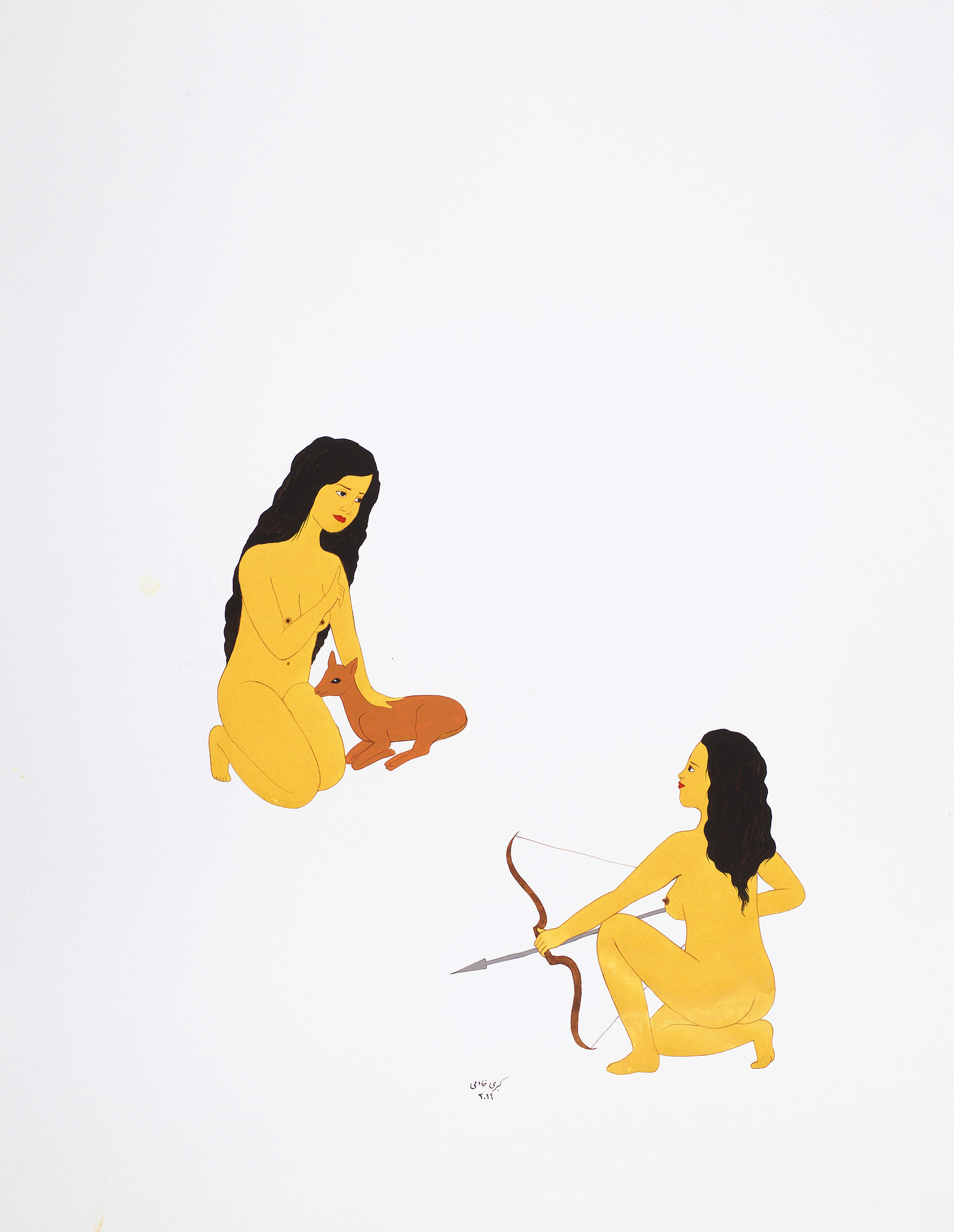Folkloric Dragonslayers: Kubra Khademi at Galerie Martin Kudlek
With her provocative and dignified paintings of imagined heroines, Kubra Khademi builds on and breaks with both religious and artistic tradition.
An art historical face-off
Kubra (Millennial, French-Afghan) actually had two openings in one day: Apart from her show at Galerie Martin Kudlek, her work now shares one space with works by Pablo Picasso (1881-1973, Spanish) at Museum Ludwig. Just as the Ludwig’s curator Eboa Itondo (Millenial, German) contrasts the hostile and sexist images of women created by Pablo with the empowering tales of Kubra, the gallery intends something similar on a smaller scale. The chosen work is Gravure 117 (1971). It shows a group of young Parisian sex workers and their pimp, la patronne, along with a photobomb of fellow painter Edgar Degas (1834-1917, French) in the right corner. While all other figures are just empty shapes held together with nothing but thin outlines, the pimp is the only sculpted figure with depth. The visual flatness of this group portrait builds the bridge to Kubra’s heroines. The paper has more texture and physicality than her bright shadowless figures. Kubra interrupts the flatness with occasional gold leaf details that might reference both Christian markers of sanctity and elaborate Persian miniature paintings.

A tale as old as time?
The art is guided by a paradox of her own cultural upbringing: While she witnessed the physical and psychological strength of her mother and heard of her grandmother’s resilience in giving birth while working in the field, stories of bravery, courage, and power were strangely only reserved for male heroes. She switches roles, putting women in the center of popular Afghan stories. These heroines of a parallel universe are compassionate towards helpless animals and fearless when facing and slaying the dragon that devours women in Afghan mythology. The rescue from the dragon comes in three paintings as three acts with the determination of Julius Ceasar’s Veni. Vidi. Vici (I came, I saw, I conquered).

Within the current art scene, she is not the only artist with such a feminist approach to folklore and tales. While her contemporary Soraya Sarghi (Millenial, Iranian) for example frames her heroines in rich textures and colorful patterns, Kubra keeps a pure background and completely isolates the nude figures. The heroine of Drachentöterin II (2023) shows no signs of aggression or rage as she pushes her teeth into the flesh of the dragon and sits down in Drachentöterin III (2023) with blood running down her chin as her victim lets out one final cold silvery sigh.

Sinful sanctity
Kubra’s take on male-dominated ideas of heroism and religion has lead to serious repercussions in her homeland. The artist had to flee Afghanistan after walking through Kabul in a body-hugging armor suit during her performance Armor (2015). Yet her work has remained provocative and challenging ever since. Kubra’s new Two Page Book series is made up of close-ups of women’s arses bearing poems by the ancient Persian storyteller Rumi (1207-1273). There is more correlation than you might expect. The two-page book as an idiom refers to the bottom while the chosen Rumi poems reflect on emptiness and holes (I came across several poems referencing holes, i.e. Every Craftsman and The New Rule, depending on the translation).
Just as there is a humorous desire to provoke emotions, there is also one to provoke thoughts. An anus might be quite a literal interpretation of Rumi’s reflections, obviously an offensive one. However, the offense comes from the belief that the human body is unclean and sinful. A woman’s body even more so. What if there was no shame in the female body? What if every part of it was of equal dignity and virtue? What would then the difference be between golden letters and golden bodily fluids?
Discover new and old tales at Kubra Khademi until December 6, 2023, at Galerie Martin Kudlek.
Galerie Martin Kudlek
Schaafenstrasse 25
50676 Cologne
Open Wednesday to Friday noon to 6 pm, Saturday noon to 6 pm
Admission free
Website
This one really makes me want to pull out some Rumi poems. How about you? Tell me your thoughts in the comment, leave a like or maybe you want to share this review? Thank you for reading!
See you soon!!!
Jennifer
The Gen Z Art Critic





